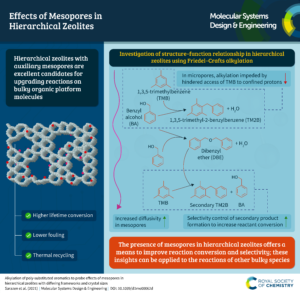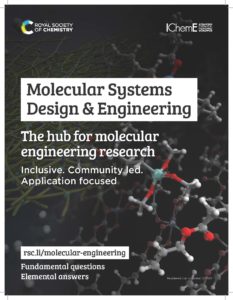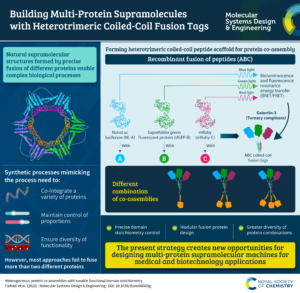It is with our great pleasure to announce Prof. Michele Sarazen (Princeton University, USA) as the winner of the 2021 Molecular Systems Design & Engineering Outstanding Early-Career Paper Award.
This is in recognition of her leadership of the paper, ‘Alkylation of poly-substituted aromatics to probe effects of mesopores in hierarchical zeolites with differing frameworks and crystal sizes’, DOI: 10.1039/D1ME00062D
Check out this bespoke infographic summarising the paper

Please join us in congratulating Prof. Sarazen!
About the winner
 |
Michele L. Sarazen is an Assistant Professor in the Department of Chemical and Biological Engineering at Princeton University. Her research group at Princeton couples synthetic, kinetic, and theoretical investigations of porous crystalline materials as catalysts and adsorbents for sustainable fuel and chemical production with an emphasis on reaction and deactivation mechanisms. She earned her BS in Chemical Engineering, summa cum laude, at the Pennsylvania State University and her PhD in Chemical Engineering from the University of California, Berkeley. She was also a postdoctoral fellow at the Georgia Institute of Technology. Her recognitions include the National Science Foundation Graduate Research Fellowship, Howard B. Wentz, Jr. Junior Faculty Award, National Academy of Engineering Frontiers of Engineering, The Catalysis Review Mover & Shaker, as well as a Division Director for the American Institute of Chemical Engineers and the recent Chair of the Catalysis Society of Metropolitan New York. |
Check out our interview with Prof. Sarazen below:
Can you briefly summarise your paper?
This paper probes how the inherent diffusion constraints of varied zeolite architectures with differing crystal sizes impact the incorporation and functionality of auxiliary mesopores, to optimize the alkylation of poly-substituted aromatics. However, the fundamental insights into hierarchical zeolite reaction–diffusion–deactivation detailed here can be applied broadly to reactions of other bulky species, including biomass-derived oxygenates, for more atom-efficient chemical and fuel production.
What aspect of your work are you most excited about at the moment?
I enjoy the constant interplay between reaction and diffusion and how we can control the two to optimize selectivity for increasingly bulky reactants. Additionally, this work applies many of the fundamental pillars of chemical engineering combined with chemical and materials synthesis to meet sustainable fuel and product demands.
Where do you see the field of catalytic active site engineering in five years’ time?
Energy and manufacturing transformations that make use of environmentally friendly or waste materials will need to increase their efficiencies, which can be done through catalytic active site engineering that either makes processes more selective or have lower energy footprints. Additionally, making cognizant design decisions concerning catalyst synthesis protocols and reagents will continue to play a role.
How do you feel about Molecular Systems Design & Engineering as a place to publish research on this topic?
MSDE values work that employs combined experimental and computational approaches for rational design of materials and reactions. This work strives to systematically introduce auxiliary mesopores with optimized diffusion capabilities, which ultimately impact catalytic rates, selectivities, and lifetimes.
How do you like to spend your time when not doing research?
I enjoy hiking with my dog, Navier-Stokes as well as baking, though the latter sometimes feels too much like synthesis sometimes.
Can you share one piece of career-related advice for those beginning their research career?
Giving back through mentoring will pay dividends through research. Your students can only do their best work if they feel supported.
Read the paper for FREE until 31 March 2023
Alkylation of poly-substituted aromatics to probe effects of mesopores in hierarchical zeolites with differing frameworks and crystal sizes
Hayat I. Adawi, Florence O. Odigiea and Michele L. Sarazen
Mol. Syst. Des. Eng., 2021, 6, 903-917, DOI: 10.1039/D1ME00062D
About the award
The aim of the Molecular Systems Design & Engineering Outstanding Early-Career Paper Award is to recognise a researcher in the earlier stages of their research career for their leadership in reporting original research published in the journal.
The journal Editorial Board award this prize annually, selecting the paper which they find to demonstrate the highest quality of research, as well as importance to the advancement of the field of molecular engineering, out of all qualifying papers published in the journal each year.
Eligibility
In order to be eligible for this award, the candidate must:
- Be listed as a corresponding author on the paper
- Currently be an independent research leader
- Have either a) received their PhD on or after 1st January of the year 12 years prior to the award year (2009 for prize year 2021) or b) spent no more than an equivalent amount of time in research when taking into account any career breaks.
- Have a paper featured in the journal’s Emerging Investigator Series – further information about eligibility for the Emerging Investigator Series can be found here. The Editorial Office will consider applications to the Series on their own merit; please contact us if you are interested in being considered for the series or nominating an exceptional early-career colleague.
- Not be a previous winner of this award
|
 |
Selection Process
To choose the winner of the 2021 Molecular Systems Design & Engineering Outstanding Early-Career Paper Award, a shortlist of eligible articles that were published throughout the year were selected by the editorial office and then subsequently assessed by the journal’s Editorial Board. The winner was selected based upon the significance, impact and quality of the research.
Prize
The winner of the Molecular Systems Design & Engineering Outstanding Early-Career Paper Award will receive an engraved plaque, a bespoke infographic from Impact Science for the winning paper and £500 cash award that would be used for conference travel/attendance of their choice.
To have your paper considered for the 2023 Molecular Systems Design & Engineering Outstanding Early-Career Paper Award, indicate when prompted upon submission of your revised manuscript if a corresponding author of the paper fulfils the criteria to feature in the Emerging Investigator Series. If accepted, your paper will be added to the ongoing collection and will be considered for the award. Multiple eligible authors of a winning paper will share the prize fund equally. You can contact the editors at molecularengineering-rsc@rsc.org if you have any queries.
















